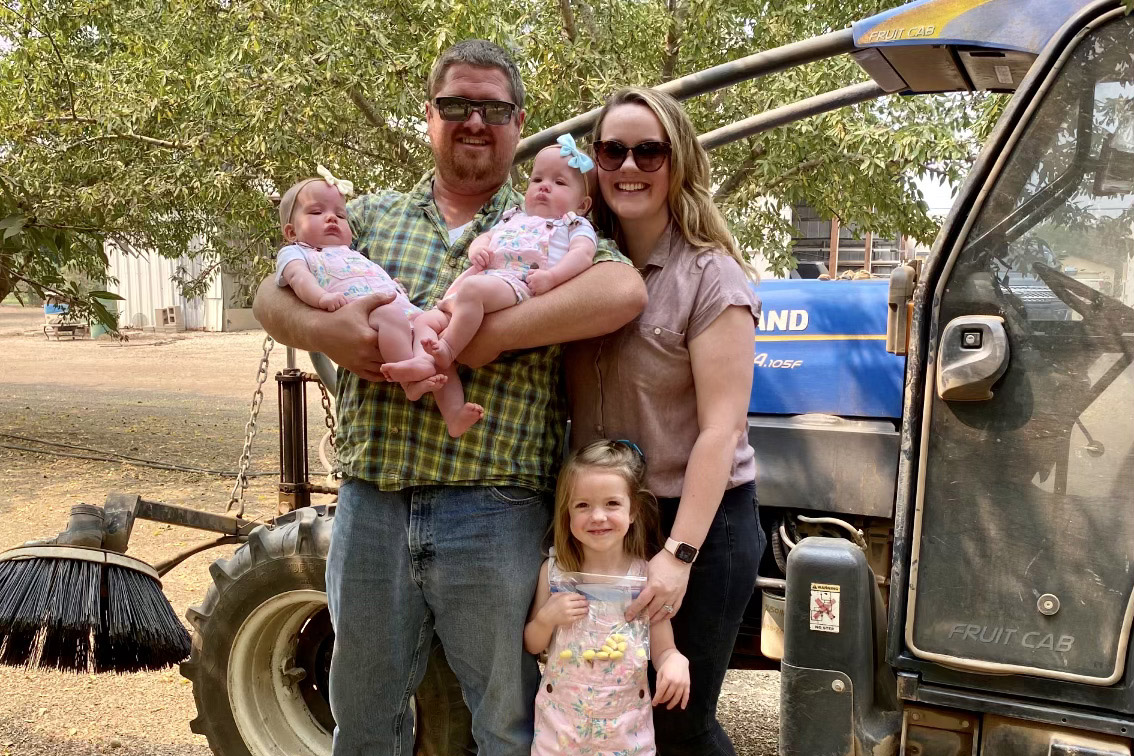5 Questions with Fifth-Generation Farmer Derek Sohnrey

Story by Nicole Johansson
Derek Sohnrey (Agricultural Business, ’13) admits he doubted college would have a lot of value for him because he planned to take over the family farm after graduating. But his experience at Chico State would prove to be nothing short of transformative. Today, as one of three brothers who all say their official title is “farmer” at Sohnrey Family Foods, he spends his day growing primarily rice and almonds, operating Sohnrey Family Foods store, and also growing walnuts, prunes, family fruit orchards, and gardens in Butte, Colusa, and Yuba Counties. In each role, he blends the lessons of his faculty and modern technology with five generations of family farm experience. This month, he’s excited to showcase the business and his industry to visitors as one of 31 destinations on the new Sierra Oro Farm & Wine Pass, where you can tour, taste, and toast for 31 days in October. Passes are still available, and he’d love to see fellow Wildcats on the trail.
What experiences at Chico State most shaped your career today?
I learned a ton about business, and it has helped propel our family’s growth and expansion in agriculture. One professor who really made a difference for me was Dave Daley. He shaped the way I speak and write about agriculture. I was actively farming while I attended school, so when I was on campus, I was able to apply what I was learning to real-world experience, and it was great to be able to see how things go together. Professor Jake Brimlow, who taught agriculture economics and ag business classes, really had an impact on me. I was able to take what I was learning and combine it with computer classes, where I was taught how to make spreadsheets. Today, that’s how we track our accounting. These big complex spreadsheets help us to make decisions faster because we have the numbers. It’s been helpful for projecting financial scenarios and outcomes and answering questions such as “Can we lease this property? Or can we afford to buy this property?” And “Does it make sense for us in the long-term?”
What are you doing differently than your dad and your grandfather did?
We have capabilities today to do things that they didn’t have, such as massive tractors with computers and GPS systems. We work less hours, and the hours are easier, not as hot and dusty. Our tractors have air conditioning and auto-steering—in many cases, they drive themselves. It’s allowed us to do things faster and more efficiently. As far as management of the farm, there’s a lot more office work today and less tractor and fieldwork. My wife appreciates that I can make it home for dinner, whereas that was not the case with my dad and his dad—they were 24/7 out in the field. My grandfather would roll over in his grave with all the paperwork that goes into running the farm, and the regulations and compliance that we must pay a fee and checkboxes for what sometimes seems like very simple tasks.
Your farm is very technology forward. Can you explain some of the new technologies you’ve invested in and how they’ve benefited your farming operation?
Technology in general has allowed us to do more things with less time and less manpower, and given us better information to make educated decisions. We have invested in water conservation practices including soil moisture sensors, wind sensors, rain gauges. Farmers are the original conservationists. Everything we do is technically on the conservation side of things, because the more we save, there is a financial benefit to us. And water is the lifeblood of our operation and lifestyle. Buying water is costly, and saving water for the future is important.
What is your advice for young ag students at Chico State?
Only 1 percent of people have chosen farming as their profession. As far as farming and family farming heritage and legacy, it’s an honor to be working the same ground as our great grandfather did. It’s a different but very good lifestyle. We make our living working with Mother Nature.
There are so many different aspects and industries that support farming, whether you like science, business, sales, or manual labor. There is every sector of business within agriculture. There will always be agriculture because people need to eat. As far as new students who aren’t “born” into it, there are less people going into agriculture now, so there is more and more opportunity for people who have a passion for growing food. It’s good job security. And it’s a seasonal lifestyle. There is a busy time and slow time, and you know when those are coming.
Why did you join the Sierra Oro Farm Trail?
Any agri-tourism is good because there is an ever-growing disconnect between the public and farming. Most people think their food comes from the grocery store. The more we can connect people with the farm, farm tours, and education, the better off everyone will be. It allows people to understand what it took to make their food and what is needed to accomplish getting it on your dinner table. This is our sixth year on the farm trail, and it’s provided an amazing outlet to educate people who come through, especially this year with the new digital Farm & Wine Pass. During harvest, the harvesters are running nearby, and people can come to the farm and experience harvest. It also gives us a chance to connect with people. There’s a good chance you are going to meet a farmer if you come to Sohnrey Family Foods.
Nicole Johansson is a Butte County resident who has worked as a marketing communications professional for the last 23 years. She is passionate about contributing as a writer and communicator to make our community a better place.


